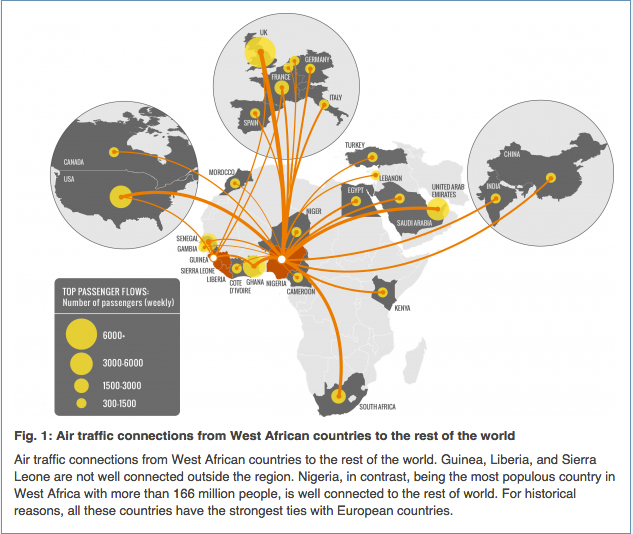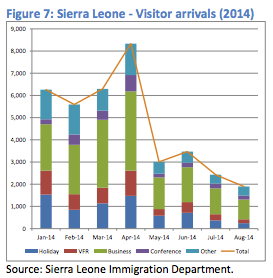
The Reason There Are Fewer Russian McDonald’s
October 19, 2014
Why There is Less Marriage
October 21, 2014Ships delivering grain to West Africa might refuse to dock because of the Ebola outbreak. The World Bank calls it “aversion behavior.”
Most of the economic impact of an infectious disease outbreak might not be caused by the disease itself. Yes, people with an infectious disease may need public sector healthcare and, in the private sector, they and their caregivers can no longer go to work. However, for the SARS and H1N1 flu epidemics, the World Bank estimates that 80 to 90 percent of the economic impact was caused by changes in our behavior.
The Economic Impact of Aversion Behavior
With SARS and H1N1 and now Ebola, the fear of contagion has affected public and private decision-making. We can identify disruptions by looking at air, land and water travel, businesses and border policies.
This map of air travel from PLOS, “Assessing the International Spreading Risk Associated with the 2014 West African Ebola Outbreak,” conveys an image of the possible lost connections to which the World Bank refers:

From: PLOS by Marcelo F.C. Gomes et al.
In Sierra Leone, by September 1, the number of weekly flights plunged from 31 to 6. Among the country’s six hotels in Freetown with 490 rooms and 500 employees, two have closed. Responding to occupancy rates that plummeted from more than 60 percent to 13 percent, these hotels vastly diminished their work force. Correspondingly, airline staffing is way down as is demand for water taxis and ferries.
You can also see (below) the precipitous drop in visitor arrivals:

From: World Bank
Although the World Bank explained that quantifying aversion behavior is inexact, they conveyed its scope with domestic and international data. Domestically, their focus was transportation disruptions and increasingly higher transaction costs impacting land, labor and capital. With trade, they cited the escalating imbalance between lower prices for West African exports and more expensive imports. For foreign direct investment (FDI), the problem has been canceled projects and underutilization of existing foreign-owned businesses.
Our Bottom Line and GDP
As we expressed in our previous post on the economic impact of Ebola in Liberia, the victim is the GDP. Depending on the Ebola trajectory, the impact on West Africa’s production of goods and services could be short term or have a long lasting catastrophic impact.

From: World Bank
![econlifelogotrademarkedwebsitelogo[1]](/wp-content/uploads/2024/05/econlifelogotrademarkedwebsitelogo1.png#100878)



